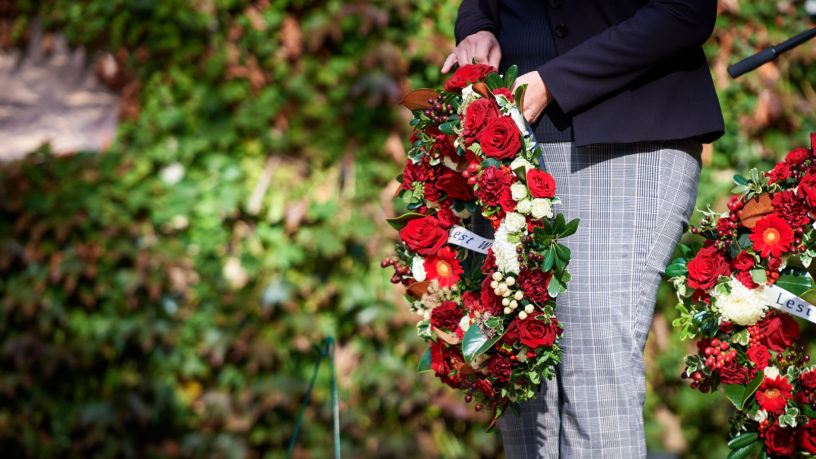By Anastasia Blosser and Gabriela Silva Ponte
Toronto Metropolitan University’s (TMU) Remembrance Day ceremony held on Nov. 10 on the Kerr Hall Quad brought attention to the contemporary need for human rights protection.
The ceremony took place by the flagpole, where the flag was at half-mast, at 10:45 a.m. with approximately 30 individuals present.
TMU president Mohamed Lachemi invited community members to gather and to “commemorate the end of the [First World War] and pay tribute to the sacrifices made by all those who served.”
Remembrance Day has historically been a time to pay tribute to Canadian veterans who fought during times of conflict, according to a statement from the Prime Minister of Canada.
Provost and Vice-President, Academic Roberta Iannacito-Provenzano was visibly emotional as she shared her sentiments regarding the day and the current state of the world.
“Today we are gathered to pay tribute to those who have fought for the rights and freedoms we enjoy here in Canada,” she said.
Iannacito-Provenzano encouraged the attendees to pause and reflect on those affected by the two World Wars, but also by current and ongoing conflicts around the globe.
“Many of us today have been touched by war in our lives. Beyond our borders, millions are suffering the fall of conflicts, hostilities, intentions. Some with no access to food, safety or shelter,” Iannacito-Provenzano said. “The ongoing violence in the Middle East has been tragic and profoundly distressing.”
Wreaths were then laid for TMU alumni, staff and administration, followed by a playing of The Last Post.
Jennifer Tunnicliffe, a professor of history at TMU, also spoke on the relationship between war and the protection of human rights.
Tunnicliffe said that Remembrance Day is also a time to celebrate the work of those who strengthen human rights protections around the world.
She said Canadians have historically used the term civil liberties to refer to a narrow set of rights that were not available to all Canadians.
“At the time of the Second World War, Canada had virtually no laws to explicitly prohibit discrimination,” Tunnicliffe said in her speech.
Tunnicliffe said that though the war effort was presented as a fight to protect human rights, up to 24,000 enemy nationals were interned on Canadian soil. She said these examples of discrimination led to the legislation that protected the rights and freedoms of Canadians.
The Universal Declaration of Human Rights (UDHR) was published 75 years ago and according to Tunnicliffe, was the first document to propose a set of inalienable human rights into international law.
“The work of this document is unfinished,” Tunnicliffe said. “Many people around the globe don’t have access to the rights it prescribes and the devastating experiences of millions of victims of human rights violations illustrates how far the world still is from realizing the ideals which guided its drafting.”
Tunnicliffe said Canada has a strong narrative of human rights protections but there are many groups who have faced a long history of discrimination.
“We need to think about them because I don’t think it serves us well to only have this really strong narrative of Canada,” she said. “[Remembrance Day] should be a time to look past only positive narratives of our human rights history and also engage with the difficult realities of our past and our present shortcomings.”
Ryan Kerr, who works in the ceremonials office which organizes events for the TMU community like convocation or Remembrance Day, said despite this event being smaller, it is still an opportunity to provide a “safe space” for community members who chose to attend.
“The challenge with Remembrance Day is that historically, it’s been about honouring veterans from wars that [happened] almost 100 years ago,” he said.
“The goal for me is to create an environment that touches on the history of Remembrance Day while acknowledging our current present…That is all about tying the connections and creating connections between where we used to be and where we are now,” Kerr said in an interview with The Eyeopener.
Kim McDonald, a TMU community member, said she attends Remembrance Day events every year because she thinks it’s crucial.
“In recent years, and this year as well, there’s so much going on worldwide that I think it’s important to take the time to reflect on these things,” she said.
The famous poem “In Flanders Fields,” by John McCrae, was read aloud and the Toronto Metropolitan A capella Collective performed “O Canada” to end the ceremony.
“Peace is not just an abstract concept confined to the pages of history or distant lands. It’s a daily practice, a commitment we must uphold in our interactions with each other. It’s up to all of us,” Iannacito-Provenzano said. “We must nurture understanding, empathy [and] tolerance. Embracing diversity as a source of strength rather than division.”










Leave a Reply